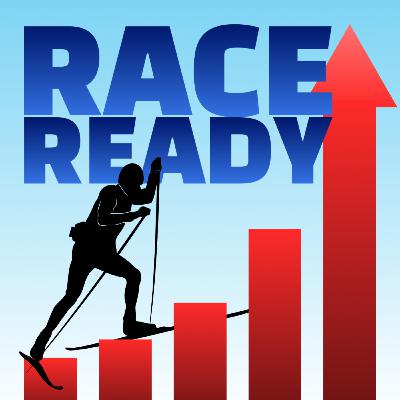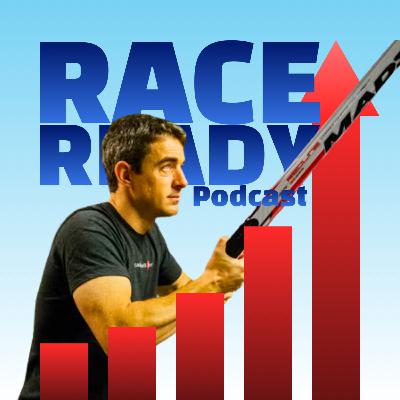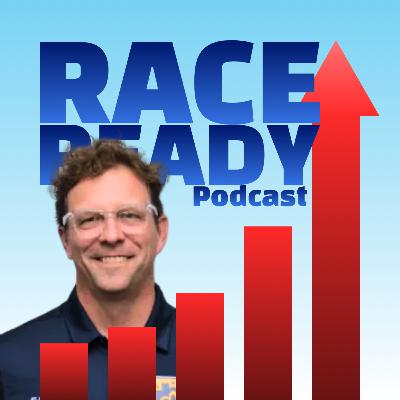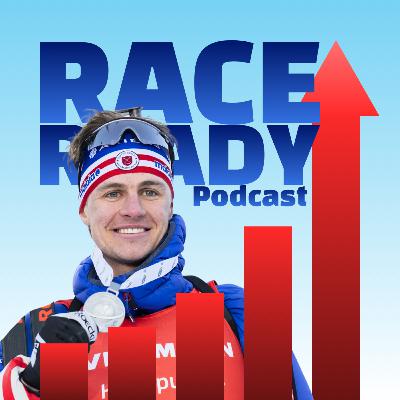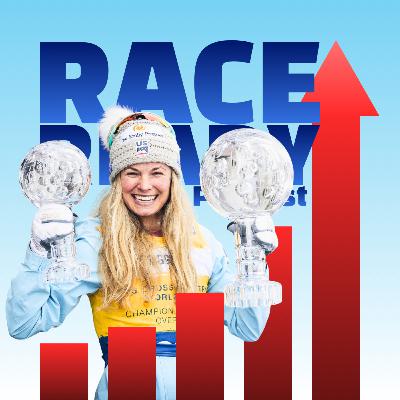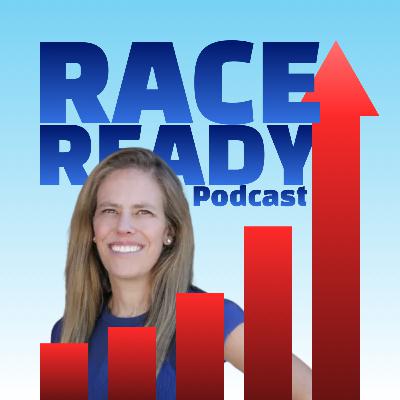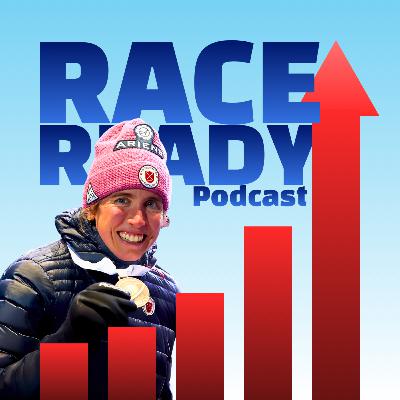Discover Race Ready
Race Ready

Race Ready
Author: Nordic Team Solutions
Subscribed: 15Played: 368Subscribe
Share
© Nordic Team Solutions
Description
Race Ready is the go-to podcast for Nordic skiing and biathlon coaches, athletes, and endurance sport enthusiasts. Hosted by Olympian Andy Newell and U.S. Biathlon coach Brian Halligan, each episode dives into technique, training, race strategy, and athlete development. Hear from top coaches, pros, and sport scientists as we explore what it takes to perform at your best—on and off the snow.
Contact us with questions or topic requests: contact@nordicteamsolutions.com
Contact us with questions or topic requests: contact@nordicteamsolutions.com
42 Episodes
Reverse
In this powerful episode of the Race Ready Podcast, Brian Halligan and Andy Newell sit down with Olympic gold medalist Kikkan Randall for a deep dive into life after elite competition — and the lessons that still shape high-performance athletes today. From her transition into Olympic governance with the IOC, to leading grassroots skiing in Anchorage, to working behind the scenes with NBC’s Olympic coverage, Kikkan shares how her career evolved after racing, including her journey through breast cancer and becoming a mom of two — all while staying deeply connected to the sport she loves. The conversation shifts into an honest, behind-the-scenes look at what it truly takes to peak for the biggest races in the world. Kikkan breaks down how her best performances came not from over-specializing, but from building a massive aerobic base, trusting long-term training, and resisting the urge to over-taper. She opens up about the mistakes she made heading into the 2014 Sochi Olympics, how small changes in training load completely altered her performance, and what she learned that ultimately helped lead to Olympic gold in Pyeongchang. Beyond physiology, this episode delivers some of the most valuable mental performance insights you’ll hear — from handling Olympic pressure and media attention to racing with purpose instead of fear. Kikkan explains how focusing on process over medals transformed her mindset, why setbacks often become competitive advantages, and how perspective can unlock peak performances when it matters most. Whether you’re an elite athlete, coach, or endurance sport fan, this episode is packed with real-world lessons on training smarter, trusting the journey, and performing when the stakes are highest.
In this episode of the Race Ready Podcast, Andy Newell and Brian Halligan dive deep into one of the most debated topics in endurance sports: peaking for championship events. Drawing from elite World Cup trends, Olympic preparation strategies, and real-world coaching experience, they unpack why peak performance isn’t something you chase in the final week — but rather something built intentionally through well-timed stress, smart tapering, and understanding how the body actually adapts. The conversation explores how modern athletes are shifting from traditional volume-heavy prep to intensity-driven race blocks like the Tour de Ski, and what that means for skiers and biathletes at every level Andy and Brian break down practical peaking strategies for different types of athletes — from Olympic contenders and juniors heading to national championships, to masters athletes preparing for long marathon races like the Birkie. They explain how racing itself can be one of the most powerful training tools, why over-tapering often backfires, and how the balance of intensity, frequency, rest, and lifestyle stress can make or break performance on race day. Whether it’s when to add volume, when to pull back, or how close to competition hard efforts still matter, this episode gives clear, actionable insight grounded in both science and experience.Beyond physiology, the episode also touches on the mental side of championship performance — from managing stress in high-pressure environments like the Olympics to building positive team culture and athlete confidence. Andy shares powerful team-bonding strategies and lessons from elite competition that highlight why athletes are people first and racers second. It’s a thoughtful, practical, and motivating conversation for coaches, athletes, and anyone chasing their best performance when it matters most.Link to the study mentioned:https://www.researchgate.net/publication/263010572_The_Road_to_Gold_Training_and_Peaking_Characteristics_in_the_Year_Prior_to_a_Gold_Medal_Endurance_PerformancePodcast episode mentioned:https://www.fasttalklabs.com/fast-talk/reclaiming-success-through-mattering-connection-and-purpose-in-competitive-sports-with-sonya-looney/?_gl=1*168r43q*_up*MQ..*_gs*MQ..&gclid=Cj0KCQiA-YvMBhDtARIsAHZuUzJIJQ8dB8y6cW7j7N-kVE0zI6RS0JaZx8jNYlQuKFsfSSeC9hCBmXsaAvAsEALw_wcB&gbraid=0AAAAAByunjsEDKL9FqERqoQQ6biDDDhZw
In this episode of the Race Ready Podcast, Andy Newell and Brian Halligan sit down with JD Downing, one of the most influential figures in U.S. masters skiing and a driving force behind XC Oregon and American Cross Country Skiers. With more than two decades of experience coaching, organizing, and leading Team USA contingents to the Masters World Cup, JD offers a rare, behind-the-scenes look at how masters skiing really works—from grassroots development to international competition. The conversation dives deep into the evolution of masters racing, why participation has declined in some areas despite the sport’s overall growth, and what truly keeps athletes engaged for decades. JD shares sharp insights on coaching masters of all ages, explaining why customization, patience, strength training, and easy volume matter more than chasing intensity. From training templates and tapering strategies to technique fixes for fit but inefficient skiers, this episode is packed with practical wisdom for athletes balancing performance, longevity, and real life. JD also previews the upcoming Masters World Cup in the Dolomites, describing the unique culture, challenges, and joy of racing on the world stage well into your 50s, 60s, 70s—and beyond. With stories ranging from jet-lagged race prep to 99-year-old competitors still toeing the line, this episode is a powerful reminder that Nordic skiing is truly a sport for life. Whether you’re a coach, a competitive masters athlete, or someone who just loves staying fast on skis, this is a conversation you won’t want to miss.
In this episode of the Race Ready Podcast, Andy and Brian check in from opposite sides of the Atlantic as Brian joins the show live from Latvia during the IBU Junior Cup. The conversation opens with insight into international racing environments, athlete development at the Junior Cup level, and how these European competitions serve as a critical stepping stone toward World Juniors, World Cups, and ultimately the Olympics. Along the way, they reflect on how racing abroad compares to domestic competition and why these experiences matter so much for long-term athlete growth.The discussion then shifts to a deep recap of U.S. Nationals in Lake Placid, highlighting the rising level of American racing and the unprecedented number of Olympic spots potentially earned through domestic performances. Andy and Brian break down what several standout athletes share in common non-traditional preparation paths that included time away from racing, dual-sport backgrounds, or forced resets due to injury or illness. Rather than seeing these disruptions as setbacks, they explore how mental freshness, perspective, and pressure management may actually be key ingredients for peak performance when it matters most.Finally, the episode turns into a practical masterclass on racing and traveling in Europe. From jet lag, hydration, and fueling strategies to mindset, afternoon race preparation, and avoiding common first-time mistakes, Andy and Brian share hard-earned lessons from decades on the international circuit. They also tackle listener questions on ski prep, waxing resources, and why some athletes thrive overseas while others struggle. The result is an episode that blends storytelling, high-level analysis, and actionable advice for athletes, coaches, and fans who want a deeper understanding of what it really takes to perform on the world stage.
In this episode of the Race Ready Podcast, Andy Newell and Brian Halligan sit down with Ned Dowling, physical therapist at the University of Utah Orthopedic Center and one of the leading biomechanical minds working in endurance sport today. With experience spanning pro cycling, World Cup cross-country skiing, and ski mountaineering, Ned brings a unique, systems-level perspective to performance, injury prevention, and recovery at the highest level of the sport. The conversation kicks off in the middle of U.S. Nationals, setting the stage for a deep dive into what it really takes to stay healthy and fast through dense racing blocks.Ned breaks down recovery in a way that cuts through the noise—explaining why sleep, nutrition, hydration, and intelligent active recovery matter far more than most “gimmicky” recovery tools. He unpacks what’s actually happening in the body after hard efforts, separating biomechanical, metabolic, neural, and psychological load, and explains how athletes should think about recovery between sprint heats, back-to-back races, and long competition periods. From spin bikes and massage tables to caffeine timing and nervous-system regulation, this episode delivers practical, experience-driven insight for athletes at every level.The discussion then shifts into injury patterns specific to cross-country skiing, including low back pain, knee issues, and chronic exertional compartment syndrome—a condition that disproportionately affects skiers. Ned shares his evolving theory on why this happens, why traditional treatments often fall short, and how improving single-leg stability and hip-driven movement can make a real difference. The episode closes with a must-listen breakdown of neutral spine poling, explaining why “crunching” into the poles is inefficient, risky, and ultimately limiting for long-term performance. If you’re a skier, coach, or endurance athlete who wants to train smarter and stay healthy longer, this episode is essential listening.
In this episode of the Race Ready Podcast, Andy Newell and Brian Halligan sit down with elite skier and trail runner Erika Flowers for a wide-ranging conversation on training, racing, and life as a professional athlete juggling work, family, and competition. Recording from a snowy holiday break in Vermont, the discussion opens with reflections on East Coast skiing culture before diving into Erika’s unique background as a multi-sport athlete, NCAA All-American, World Cup racer, and North Face–sponsored runner — all while working a full-time professional job and raising a young child .Erika offers an honest and refreshing look at how her training philosophy has evolved since becoming a working parent. Rather than chasing perfect plans or high training volume, she emphasizes flexibility, feel-based decision-making, and identifying just a few key sessions each week that truly move the needle. The conversation explores why “something is better than nothing,” how perspective can actually improve performance, and why many athletes race better when their identity extends beyond results alone .The episode also dives deep into athlete development, coach-athlete trust, and navigating transitions — from college to post-collegiate racing, from skiing to running, and from rigid structure to adaptable training. Erika shares hard-earned lessons on patience, communication, and long-term thinking, offering valuable takeaways for masters athletes, young racers, and anyone balancing ambition with real-world demands. It’s a thoughtful, relatable conversation about staying competitive, resilient, and joyful in sport — even when life is busy and far from perfect.
In this episode of the Race Ready Podcast, Brian Halligan and Andy Newell sit down with Gary Chambers, a fourth-generation Alberta grain farmer, CANSkI Level 4 instructor, Alberta Masters Association director, and Masters World Cup competitor to explore what makes masters skiing such a powerful and often overlooked part of the Nordic community. From Norway’s participation culture to North America’s event landscape, Gary offers a big-picture perspective on how masters racing thrives when community, mentorship, and meaningful competition intersect .The conversation dives deep into the realities of masters training: balancing family, careers, physical labor, and recovery while still chasing performance. Gary shares insights on why learning to ski fast (regardless of race goal) can unlock better technique, confidence, and enjoyment on snow. He and Andy unpack common masters training pitfalls, including over-reliance on volume, fear of speed, and the challenge of adapting recovery and intensity as athletes age, all while emphasizing that masters deserve to be treated as serious athletes, not handled with “kid gloves” .The episode closes with a forward-looking discussion on mentorship, cross-generation integration, and the role masters athletes can play in sustaining the sport. From supporting youth programs to showing up at start lines alongside elite athletes, Gary makes a compelling case that Nordic skiing is strongest when it refuses to operate in silos. The upcoming 2029 Masters World Cup in Canmore becomes a symbol of that vision, a homecoming where competition, camaraderie, and lifelong passion for skiing all meet on the same start line.
In this episode of Race Ready, Andy Newell and Brian Halligan break down the biggest early-season takeaways from the Biathlon and Cross-Country World Cups, including surprising yellow-bib leaders, hot starts from U.S. athletes, and why it’s dangerous to draw conclusions too early in the season. They discuss how elite athletes manage training volume during the opening weekends, what it really means to “keep the pedal down” while racing, and how altitude venues like Davos can reshuffle the deck once again.The conversation then shifts into a deep dive on training methodology, from VO₂ max development and double-interval days to the rise of highly specialized “engine” athletes (especially within the Norwegian system). Andy and Brian unpack what the data actually tells us about VO₂ max changes, survivorship bias in extreme training models, and why most developing athletes shouldn’t blindly copy what World Cup stars are doing. This section offers valuable context for coaches, juniors, and masters alike who want to understand how aerobic development really works.Finally, the episode turns practical, offering actionable advice for coaches and athletes heading into the heart of the season. Topics include how to rebuild fitness mid-season, how to peak again after early races, pacing and technique strategies for altitude racing, and tips for running effective middle school and high school practices. Whether you’re coaching young athletes, preparing for a championship block, or just trying to race smarter this winter, this episode delivers real-world insight from two coaches living it every day.
In this wide-ranging and deeply insightful conversation, Brian Halligan and Andy Newell sit down with Dr. Øyvind Sandbakk—one of the most influential figures in modern endurance training science. From his early days as a competitive skier to his role as a professor, researcher, and architect of much of what the world now calls the “Norwegian training model,” Øyvind shares the winding path that led him from athlete to coach, scientist, and mentor to some of the best endurance performers on the planet. The discussion blends real-world coaching wisdom with decades of applied research, offering listeners a rare look behind the curtain of elite performance development. The episode dives deep into how training theory actually gets built (not from shortcuts or trends) but from systematic observation, precise intensity control, and a culture of shared learning between athletes, coaches, and scientists. Øyvind explains why concepts like threshold training, intensity zones, and “polarization” are often misunderstood, and why training precision and intention matter far more than buzzwords. Using examples from cross-country skiing, biathlon, running, and triathlon, he breaks down what separates good athletes from great ones, and why quality, consistency, and recovery always beat chasing extreme volume or fashionable methods. Finally, the conversation turns toward coaching philosophy, athlete development, and long-term success. Øyvind offers practical guidance for junior athletes, developing seniors, and coaches working without access to labs or advanced tech: emphasizing training diaries, honest feedback, simple monitoring tools, and trust-based coach-athlete relationships. The episode closes on a powerful reminder that coaching isn’t just about creating champions, but about helping people grow, learn, and master their own potential. Whether you’re an athlete, coach, or endurance nerd, this episode is a masterclass in how elite performance is actually built.
This episode dives into the realities of early-season ski training, especially the challenges of “shoulder season” conditions when snow coverage is inconsistent. Andy and Brian share how coaches and athletes adapt plans on the fly, trading perfectly structured workouts for creative solutions like sprint relays on rock skis and embracing less-than-ideal snow. The key takeaway: time on snow, even in rough conditions, builds motivation, technical skill, and mental toughness, and can be more valuable than polished roller-ski training during this phase of the year. The conversation then shifts to Thanksgiving training camps, long considered a cornerstone of preparation for both juniors and masters. Both hosts emphasize that this period should focus primarily on volume and technique (not heavy intensity) allowing athletes to make one last aerobic push before the race season ramps up. Low-intensity distance skiing, drills like no-pole work, and technique-focused sessions help athletes transition effectively from roller skis to snow while developing durable habits without overloading the body. Finally, Andy and Brian explore early-season racing dynamics, including how to respond to breakout results or disappointing performances. Their advice is measured and steady: resist the urge to overreact. Athletes who start strong should maintain their training trajectory with smart volume management, while those who struggle early should stay patient, recover well, and avoid forcing extra intensity mid-week. The episode closes with insight into interval strategies, the role of high-intensity workouts (especially for masters skiers) and how thoughtful planning across the week can help athletes peak when it matters most.
In this episode of the Race Ready Podcast, Brian Halligan and Andy Newell sit down with legendary ski technician, physiologist, and mentor Zach Caldwell for a wide-ranging conversation that bridges the worlds of elite performance and real-world application. Zach dives deep into the evolving craft of ski preparation in the post-fluoro era, breaking down why methodology often matters more than brand choice, how film thickness and layering affect durability, and why meticulous scraping, brushing, and workflow discipline can completely change race outcomes. From testing iron temperatures at World Cups to analyzing cleaning layers and fleece tools, Zach explains how small technical details, executed correctly, produce big speed gains on snow.The conversation then moves into Zach’s unique coaching philosophy, shaped by decades of working with athletes like Chris Freeman, Noah Hoffman, and countless developing juniors. He outlines his key training principles, including the idea of short response times to intensity, the importance of staying parasympathetic during high-volume base work, and why aerobic “economy” must come before big power outputs. Zach shares how heart-rate variability, breathing control, and recovery monitoring guide his approach to volume training, and why elite athletes must learn to train at true low intensity if they hope to build durable engines that respond quickly when speed is required.Finally, Zach reflects on the human side of coaching, mentorship, technique, and long-term development. He explains how technique isn’t about angles or biomechanics alone, but about muscle state, blood flow, and efficiency, telling powerful stories about reworking Chris Freeman’s movement patterns to unlock late-race acceleration. He also discusses helping Freeman manage Type 1 diabetes while competing at the highest level, emphasizing that athlete relationships are built on trust, communication, and care as much as performance metrics. This episode captures the rare perspective of someone who has influenced the sport from both the waxing bench and the training track—and who believes the true legacy of coaching is the people shaped along the way.
In this week’s episode of the Race Ready Podcast, Andy and Brian dive into the chaos, excitement, and pressure of early-season ski and biathlon preparation. From crowded inboxes to snow-hunting missions and travel logistics, they share what this time of year really looks like for coaches balancing athlete needs, race schedules, and constantly shifting plans. The conversation kicks off with a reflection on the all-too-relatable “Master Blaster” workout trap: those unstructured, overly hard power-hour sessions that feel productive in the moment but derail long-term training goals.The hosts then dig deep into early-season on-snow priorities, including technique transfer from roller skis, pacing workouts, and the value of practicing race-day routines before the season officially begins. They break down why drills like no-pole skiing, early-season pace projects, and controlled L4 efforts help athletes ski smooth, stay efficient, and avoid thrashing on snow. There’s also a great discussion on ski testing, ski-fleet strategy, grinds, and communication between athletes and coaches, especially ahead of their upcoming interview with ski-genius Zach Caldwell.To wrap things up, Andy and Brian answer listener questions ranging from interval training at high altitude to the science behind VO₂ max, lactate thresholds, and how world-class endurance athletes push their limits. This section is packed with clear explanations, practical takeaways, and insights from recent physiology research. Whether you’re a racer gearing up for the season, a coach looking to refine your approach, or just a fan of ski-nerd deep dives, this episode is loaded with value from start to finish.Link to Tom Cuddy's Substack
On this episode of the Race Ready Podcast, Andy Newell and Brian Halligan sit down with legendary skier, coach, and NBC analyst Chad Salmela for a deep-dive into performance, physiology, and the evolution of endurance training. Chad opens up about his eclectic career, from racing biathlon professionally, to leading NCAA runners, to shaping the next generation of Team Berkie athletes, and how each chapter has influenced the way he coaches and interprets high-performance sport. His trademark curiosity and passion for learning come through immediately as he recounts early VO₂ max tests, time in Finland, and the origins of his Threshold podcast. The conversation shifts into training theory, where Chad explains why metabolic testing (specifically identifying ventilatory thresholds and RER1) has transformed his understanding of athlete development. He breaks down how his lab and field testing evolved over 15 years, why lactate alone can be misleading, and how he uses metabolic profiles to individualize training for both runners and skiers. The discussion also explores the nuances of pushing threshold closer to VO₂ max, the surprising volatility of certain athletes’ physiology, the challenges of sprint training, and how world-class performances emerge from mastering small details over time. Finally, the crew dives into youth development, cross-country running as a complementary sport for junior skiers, and why many athletes struggle to train truly easy. Chad shares stories from coaching at St. Scholastica, insights on why younger athletes benefit from the simplicity of running, and candid thoughts on the cultural pressures that push kids toward “looking like skiers” rather than training like developing endurance athletes. The episode is a must-listen for anyone curious about the science behind endurance sports, the art of coaching, and the mindset required to help athletes reach their potential.
In Episode 29 of the Race Ready Podcast, hosts Andy Newell and Brian Halligan reflect on the biggest lessons from this year’s training and racing season. From early-season takeaways at Soldier Hollow to insights drawn from World Cup athletes like Jessie Diggins, Julia Kern, Ben Ogden, and Campbell Wright, this episode dives deep into the mental and physical fundamentals that define elite endurance performance. The hosts explore the often-overlooked role of breathing as a trainable skill, discussing how purposeful exhales and focused respiration can enhance control, relaxation, and overall efficiency in both skiing and biathlon.Brian and Andy also unpack common themes shared by top World Cup athletes, including a process-driven mindset, training with intent, and maintaining simplicity in a world full of performance trends. They emphasize the importance of tracking progress through training logs, knowing your body, and building fitness patiently—brick by brick. Listeners gain perspective on how the best in the world balance high-level preparation with grounded, consistent habits, while also learning how to apply these insights to their own training and coaching.To close, the hosts touch on the importance of team cohesion and joy in sport. Drawing from FIS webinars and their own coaching experiences, they highlight how a supportive team culture and balanced mindset sustain long-term success. Whether you’re a coach, junior skier, or elite athlete, this episode offers practical strategies to stay motivated, focused, and connected as the season begins. Tune in to learn how intention, simplicity, and community can elevate both performance and passion in endurance sport.
In this episode of the Race Ready Podcast, hosts Andy Newell and Brian Halligan sit down with biathlon phenom Campbell Wright, Junior World Champion, U23 Blue Bib winner, and 2x World Championship silver medalist, to unpack his remarkable journey from the Snow Farm of New Zealand to the top of the international biathlon stage. Campbell shares how a small ski club at Snow Farm and a passion for racing led him to Europe at just 15, where he built a career defined by resilience, adaptability, and raw love for competition.Listeners get an inside look at the mindset behind the medals as Campbell opens up about “ego training,” the lessons learned from joining Team USA, and how he balances hard training with a lighthearted, confident approach to racing. His reflections on burnout, belief, and the “fake professionalism” often seen in elite sport are refreshingly honest, reminding athletes that joy, not tension, drives long-term success.From jet lag hacks and mental reset routines to his now-famous start-line banter and laid-back New Zealand attitude, this conversation captures what makes Campbell one of biathlon’s most authentic rising stars. Whether you’re an athlete, coach, or fan, this episode delivers motivation, laughter, and wisdom from one of the sport’s most grounded talents.
In this special episode of the Race Ready Podcast, Andy Newell and Brian Halligan sit down with Olympic gold medalist Jessie Diggins for an in-depth and deeply personal conversation about the mindset, training, and heart behind her success. From her early days racing at Minnesota high school meets to becoming one of the most decorated cross-country skiers in U.S. history, Jessie reflects on the long journey of learning, failing, and finding balance in the pursuit of excellence.Jessie opens up about her evolution as an athlete and person. From her first humbling World Cup starts to her current role as a leader and mentor on the U.S. Ski Team. She discusses how her relationship with longtime coach Jason Cork has shaped her career, revealing how trust, communication, and process-based goals have driven her consistency and joy in the sport. The episode also explores the hard lessons that came with overtraining, learning to listen to her body, and turning past struggles, including her recovery from an eating disorder, into strength and self-awareness.In classic Diggins fashion, the conversation dives into the “pain cave” that place of pure effort where physical limits meet mental grit. Jessie shares how she developed her now-iconic ability to push past pain and stay present under pressure, and how her motivation has evolved from chasing results to using her platform for something greater. It’s an inspiring, candid, and often funny conversation that captures the true spirit of one of the world’s toughest and most joyful endurance athletes.
In this listener-driven episode of the Race Ready Podcast, Andy Newell and Brian Halligan open with stories from Soldier Hollow, Whitefish, and early-season training camps before diving into a stack of listener questions. The duo explores the value of lactate testing for master skiers—when it’s worth the investment, when “easy, medium, hard” is good enough, and why feel still matters more than lab data. Along the way they touch on muscular endurance, polarized training balance, and the eternal challenge of stress versus recovery.Mid-episode, conversation turns to one of the sport’s more uncomfortable topics: doping. Drawing from the 1990s and early-2000s cross-country scene, Andy recounts the dark years of EPO, the fallout from the Finnish and Austrian scandals, and how those moments shaped the ethics of endurance sport today. Brian weighs in on biathlon’s past and the controversial idea of “enhanced games,” prompting a candid discussion about performance, fairness, and athlete health.To close, the hosts tackle health and longevity on a more personal level—how to adjust training after illness or injury, why recovery doesn’t erase fitness, and how patience pays off when returning to snow. They connect lessons from World Cup pros like Julia Kern and Dario Cologna to everyday athletes balancing family, work, and racing goals. It’s a thoughtful, wide-ranging episode packed with real-world coaching insight, endurance wisdom, and plenty of laughs from the trail.Conconi test
In this episode of the Race Ready Podcast, host Andy Newell sits down with Dr. Lauren Loberg, a performance psychology consultant whose experience spans the U.S. Ski and Snowboard Team, the NFL, and elite winter sport athletes. Together, they explore the mental side of high-performance sport — from stress management and emotional regulation to the importance of mental “prehab” for preventing burnout and injury. Lauren shares her own journey from Division I athlete to sports psychologist, revealing how personal setbacks inspired her mission to help athletes build resilience and self-awareness both on and off the field.The conversation dives into the evolution of sports psychology into what Lauren calls performance psychology — a holistic approach that extends beyond competition to everyday life. She explains how modern mental training isn’t just for fixing problems but for strengthening the mind before challenges arise. Topics include reframing negative thoughts, balancing recovery with motivation, and cultivating mental toughness through awareness and repetition. Andy reflects on his own experiences as an athlete and coach, highlighting how mental fatigue, self-talk, and visualization all influence performance during the racing season. In the final part of the episode, Lauren and Andy discuss the power of visualization, flow states, and positive self-talk in unlocking an athlete’s best performances. They unpack what really goes through an elite skier’s mind during high-pressure moments — such as Olympic races — and how athletes can learn to focus on what they can control, even amid chaos. Whether you’re a developing skier, coach, or parent, this conversation offers tangible insights into building confidence, managing anxiety, and approaching sport — and life — with a healthier, more sustainable mindset.
In this episode of the Race Ready Podcast, hosts Andy Newell and Brian Halligan dive deep into the benefits and challenges of altitude training. They share insights from observing world-class athletes like Johannes Høsflot Klæbo and Emil Iversen training in Park City, and discuss how altitude adaptation varies from athlete to athlete. The conversation covers what it means to be an “altitude responder,” why timing and duration matter, and how to maximize gains without overloading the body.From there, the discussion shifts to the role of cycling in modern ski training. The hosts compare philosophies from international coaches—some favoring running for its ski-specific benefits, others increasingly turning to cycling as a lower-impact way to build volume. Drawing from their own coaching experience, they explore how athletes can strategically add cycling into their plans, whether as early-season base work or as a recovery tool during interval-heavy training blocks.The episode rounds out with listener questions on fall training topics, including how to adjust workouts when sick, best practices for strength phases, and creative solutions for athletes without access to long training hills. Andy and Brian emphasize practical, real-world advice: prioritize recovery when illness strikes, focus on technique before heavy lifting, and adapt training creatively to your environment. Packed with actionable takeaways, this conversation offers both athletes and coaches tools to fine-tune their approach heading into the race season.Linked study about Max Strength
In this episode of Race Ready, hosts Andy Newell and Brian Halligan welcome three-time Olympian and World Championship medalist Susan Dunklee for a wide-ranging conversation about her journey from Vermont ski racer to international biathlon standout. Susan reflects on her early days growing up in a skiing family, her transition into biathlon through the early days of "Project X", and the pivotal advice from her father that set her on the path to competing at the highest level. She shares stories of racing in front of massive European crowds, breakthrough performances on the World Cup, and the psychological challenges of balancing ski speed with precision shooting.The discussion also dives into Susan’s training philosophies and the adjustments she made throughout her career to remain competitive over 11 seasons on the World Cup. She explains how she tackled weaknesses on the shooting range, developed resilience through process-oriented racing, and found balance by embracing her community at the Craftsbury Outdoor Center. The hosts highlight her 2017 World Championship silver medal performance as a career-defining moment and explore what it meant for American biathlon to achieve international success. Susan also offers perspective on longevity in elite sport, emphasizing the importance of keeping training fun and building supportive team cultures.Now serving as the Director of Biathlon at Craftsbury, Susan reflects on her transition into coaching and mentoring the next generation. She shares insights on teaching fundamentals, fostering a learning mindset in young athletes, and even creating lasting traditions like the “silver bib” for older competitors. The conversation rounds out with Susan’s work supporting para athletes and her passion for growing inclusive communities in sport. This episode is both an inspiring look back at a decorated career and a forward-looking exploration of how one athlete’s legacy continues to shape the future of biathlon.



